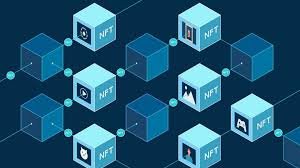Introduction
Blockchain technology is at the heart of the cryptocurrency revolution, transforming industries and redefining how we think about finance, security, and even data management. For beginners looking to dive into the world of Newznav.com Crypto Archives Page, understanding blockchain is essential. It can seem overwhelming at first, but with the right guidance, the core concepts of blockchain become clear and easy to grasp.
Welcome to the Newznav.com Crypto Archives Page, your comprehensive resource for everything crypto-related, including insightful guides, market updates, and deep dives into blockchain technology. This article serves as an introductory guide to blockchain, breaking down its key features, how it works, and why it’s transforming the digital world. Whether you’re new to the crypto space or simply looking to enhance your knowledge, this guide will simplify blockchain for you.
What Is Blockchain? Breaking It Down
At its core, blockchain is a decentralized digital ledger. It records transactions across many computers in a way that ensures data integrity and security. Unlike traditional databases that rely on a central authority, blockchain is maintained by a network of participants (known as nodes), ensuring that no single entity has control over the entire system. This decentralized nature makes blockchain highly secure and resistant to tampering.
Key Characteristics of Blockchain
- Decentralization:
One of the main benefits of blockchain is that it operates without a central authority. This means no single entity can control or manipulate the data.
- Transparency:
Every transaction made on the blockchain is visible to all participants in the network. While users remain anonymous, the transactions are public, ensuring transparency and trust.
- Immutability:
Once a transaction is recorded on the blockchain, it cannot be altered or deleted. This creates a permanent record that is highly resistant to fraud.
- Security:
Blockchain uses cryptographic algorithms to secure transactions. This makes it one of the most secure technologies available, especially for financial transactions.
These characteristics make blockchain the backbone of cryptocurrencies and other decentralized technologies, enabling trust, transparency, and security without needing intermediaries.
For a more detailed explanation of blockchain and its uses, visit the Newznav.com Crypto Archives Page, where you’ll find an array of articles and guides tailored to beginners.
How Blockchain Works: The Basic Structure

To truly understand blockchain, it’s important to break down how it works. Blockchain consists of a chain of blocks, where each block stores information about transactions. Think of it as a digital ledger, but instead of being stored in one place, it’s distributed across multiple computers, or nodes, around the world.
Here’s how blockchain works step by step:
- Transaction Occurs:
When a user initiates a transaction (e.g., sending Bitcoin to another user), that transaction is broadcast to the blockchain network.
- Validation:
Before the transaction is added to the blockchain, it must be validated by nodes in the network. This is usually done through consensus mechanisms like Proof of Work (PoW) or Proof of Stake (PoS).
- Block Creation:
Once the transaction is validated, it’s grouped with other transactions into a block. This block is then added to the existing blockchain, creating a permanent, tamper-proof record.
- Consensus:
The network participants (nodes) must agree that the transaction is valid before it can be added to the blockchain. This process of reaching agreement is known as consensus.
- Transaction Completed:
Once the block is added to the chain, the transaction is complete, and the data is available to all participants in the network.
The decentralized nature of blockchain ensures that even if one node fails, the network remains operational, providing unparalleled reliability and security.
For more in-depth articles explaining the mechanics of blockchain, be sure to check out the Newznav.com Crypto Archives Page, which features a wide range of resources for both beginners and seasoned crypto enthusiasts.
Why Blockchain Matters: The Benefits of Decentralization
Now that we’ve broken down how blockchain works, let’s explore why it’s such a transformative technology. Blockchain’s importance goes beyond just cryptocurrencies—it has the potential to revolutionize industries as diverse as finance, healthcare, and logistics. Here are some key reasons why blockchain matters:
1. Trust Without Intermediaries
In traditional systems, intermediaries like banks or payment processors are required to verify transactions and maintain trust between parties. Blockchain removes the need for these intermediaries, as trust is built directly into the system through cryptography and decentralized consensus mechanisms.
2. Enhanced Security
Blockchain’s decentralized nature and use of cryptographic algorithms make it incredibly secure. Data stored on a blockchain is encrypted and distributed across multiple nodes, making it nearly impossible for hackers to tamper with the data. This is particularly valuable in sectors like finance, where security is paramount.
3. Cost Efficiency
By removing intermediaries, blockchain reduces transaction costs. Whether you’re sending money across borders or verifying the authenticity of goods in a supply chain, blockchain can significantly lower fees and improve efficiency.
4. Transparency and Accountability
All transactions on a blockchain are visible to everyone in the network, making the system highly transparent. This is particularly beneficial in industries like supply chain management, where transparency is crucial for verifying the authenticity of goods and services.
5. Immutability and Data Integrity
Once data is recorded on a blockchain, it cannot be altered or deleted. This immutability ensures the integrity of the data and creates a reliable, permanent record of transactions.
For more insights on how blockchain is revolutionizing various industries, visit the Newznav.com Crypto Archives Page, where you’ll find comprehensive guides and articles exploring the broader impact of blockchain.
The Role of Blockchain in Cryptocurrency

While blockchain has many applications, its most well-known use is in cryptocurrency. Blockchain serves as the foundation for digital currencies like Bitcoin and Ethereum, enabling secure, transparent, and decentralized transactions.
1. Bitcoin: The Pioneer
Bitcoin was the first cryptocurrency to use blockchain technology, and it remains the most well-known and widely used digital currency. Bitcoin’s blockchain ensures that every transaction is securely recorded, preventing fraud and double-spending.
2. Ethereum: Smart Contracts
Ethereum took blockchain a step further by introducing smart contracts—self-executing contracts with the terms of the agreement directly written into the code. This allows for decentralized applications (dApps) to be built on the Ethereum blockchain, opening the door to a wide range of innovative projects.
3. Altcoins: Expanding the Crypto Space
Beyond Bitcoin and Ethereum, there are thousands of other cryptocurrencies, often referred to as altcoins. Each of these coins uses blockchain technology in different ways, from enhancing privacy (Monero) to improving transaction speeds (Litecoin). The Newznav.com Crypto Archives Page provides detailed analyses of these altcoins, helping you understand their unique features and potential.
For those looking to learn more about the relationship between blockchain and cryptocurrency, the Newznav.com Crypto Archives Page is an invaluable resource, offering articles and updates on all the major digital currencies.
Practical Applications of Blockchain Beyond Cryptocurrency
While blockchain is most closely associated with cryptocurrencies, its potential applications extend far beyond digital currencies. Here are some of the most exciting real-world uses of blockchain:
1. Supply Chain Management
Blockchain can revolutionize supply chain management by providing a transparent, immutable record of goods as they move through the supply chain. This enhances transparency, reduces fraud, and allows consumers to verify the authenticity of products.
2. Healthcare
In the healthcare industry, blockchain can be used to securely store patient records, ensuring that sensitive data remains private and tamper-proof. This technology also allows for the seamless sharing of medical records between healthcare providers, improving patient care.
3. Voting Systems
Blockchain has the potential to transform voting systems by ensuring that votes are securely recorded and cannot be tampered with. This could lead to more secure and transparent elections, enhancing trust in democratic processes.
4. Real Estate
Blockchain can simplify the process of buying and selling real estate by creating a secure, transparent record of property ownership. This reduces the need for intermediaries like real estate agents and lawyers, streamlining the transaction process.
5. Digital Identity
Blockchain-based digital identity solutions allow individuals to control their own personal information, reducing the risk of identity theft and giving users more control over their data.
For more articles exploring these exciting blockchain applications, visit the Newznav.com Crypto Archives Page and discover how this technology is reshaping industries across the globe.
Conclusion: Unlocking the Potential of Blockchain with Newznav.com Crypto Archives Page
Blockchain is a revolutionary technology that has the potential to transform industries and empower individuals by providing a secure, transparent, and decentralized way to manage data and transactions. While the concept of blockchain can seem complex, the Newznav.com Crypto Archives Page simplifies it, offering a wealth of resources for beginners and experts alike.
Whether you’re interested in learning about cryptocurrency, blockchain applications, or the future of decentralized technologies, the Newznav.com Crypto Archives Page is your go-to source for reliable, easy-to-understand information. By leveraging the content available on the archive, you can deepen your understanding of blockchain and unlock its full potential in your personal and professional life.
Explore the Newznav.com Crypto Archives Page today, and take your first step towards mastering the world of blockchain and cryptocurrency!
